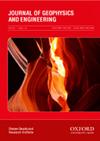超声纵波法测定喷根灰岩孔隙参数
IF 1.7
3区 地球科学
Q3 GEOCHEMISTRY & GEOPHYSICS
引用次数: 0
摘要
超声波能够帮助表征岩石孔隙。采用粘性喷射模型对饱和水喷根灰岩中测得的超声纵波相速度和质量因子进行了模拟,从而确定了灰岩的孔隙参数。测得的纵波质心频率为~ 0.75 MHz,本文进行了两次模拟。第一次模拟得到的色散曲线具有一个下降尖峰和一个上升尖峰。然而,它不能产生测量的质量因子。另一个缺点是其中一个孔隙参数违反了岩石物理特性。第二次模拟得到的频散曲线是一个小的速度下降,然后是一个向上的速度凹;同时预测了所测相速度和质量因子。得到的岩石单元尺寸为0.3 × 0.333 mm,与平均粒径0.3 mm一致。确定了相对第一孔隙度为0.97,相对第二孔隙度为0.03。颗粒接触处孔径距离倒转为1.8µm。值得注意的是,饱和水石灰岩的最小相速度低于高斯曼速度。本文章由计算机程序翻译,如有差异,请以英文原文为准。
Ultrasonic P-wave to determine pore parameters of Spergen limestone
Abstract Ultrasonic waves are capable of helping characterize pores of rocks. A model of viscous squirt is used to simulate phase velocity and the quality factor of ultrasonic P-wave measured in water-saturated Spergen limestone, thus determining pore parameters of the limestone. The measured P-wave had a centroid frequency of ∼0.75 MHz, and two simulations are conducted in this paper. The first simulation yields a dispersion curve with a dipping spike followed by a rising spike. However, it cannot yield the measured quality factor. Another drawback is that one of the pore parameters violates rock physics. The second simulation yields a dispersion curve with a small velocity depression followed by an upward velocity concave; the measured phase velocity and quality factor are simultaneously predicted. The resulting dimensions of the rock unit are 0.3 by 0.333 mm, which is consistent with the mean grain diameter of 0.3 mm. The relative first and second porosities are ascertained to be 0.97 and 0.03, respectively. The aperture distance at contact of grains is inverted as 1.8 µm. Remarkably, the minimum phase velocity of the water-saturated limestone is lower than the Gassmann velocity.
求助全文
通过发布文献求助,成功后即可免费获取论文全文。
去求助
来源期刊

Journal of Geophysics and Engineering
工程技术-地球化学与地球物理
CiteScore
2.50
自引率
21.40%
发文量
87
审稿时长
4 months
期刊介绍:
Journal of Geophysics and Engineering aims to promote research and developments in geophysics and related areas of engineering. It has a predominantly applied science and engineering focus, but solicits and accepts high-quality contributions in all earth-physics disciplines, including geodynamics, natural and controlled-source seismology, oil, gas and mineral exploration, petrophysics and reservoir geophysics. The journal covers those aspects of engineering that are closely related to geophysics, or on the targets and problems that geophysics addresses. Typically, this is engineering focused on the subsurface, particularly petroleum engineering, rock mechanics, geophysical software engineering, drilling technology, remote sensing, instrumentation and sensor design.
 求助内容:
求助内容: 应助结果提醒方式:
应助结果提醒方式:


